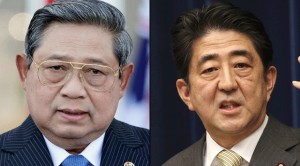
Indonesian President Susilo Bambang Yudhoyono and Japanese Prime Minister Shinzo Abe. AP FILE PHOTOS
TOKYO—Southeast Asian nations welcome Japan’s efforts to nurture closer security cooperation, given China’s growing assertiveness, though they hope the two powers will mend their frayed ties, Indonesian President Susilo Bambang Yudhoyono said on Friday.
“It must be said that good relations between China and Japan are critical to the future of our region,” Yudhoyono told a gathering on the sidelines of a summit marking 40 years of ties between Japan and the Association of Southeast Asian Nations (Asean).
Yudhoyono urged all involved to build more trust, throughout both northeast Asia, where China and Japan are bickering over islands claimed by both in the East China Sea, and in the South China Sea and the West Philippine Sea, where several countries face disputes with China.
Although Indonesia is not involved, it “is deeply concerned at the prospect of those erupting into open conflict,” Yudhoyono said.
Nurturing closer ties with Southeast Asia, an increasingly affluent, resource-rich region of more than 600 million people, has been one of Prime Minister Shinzo Abe’s top foreign policy priorities since he took office nearly a year ago.
In a year of whirlwind diplomacy that had him crisscrossing the globe, Abe visited all 10 Asean countries at least once.
China’s increasingly assertive stance in the region has advanced that courtship, while soothing any backlash across Southeast Asia against Japan’s own rising military profile.
Japanese officials describe the security situation in its East Asian neighborhood as “severe” and “rapidly deteriorating.”
The Philippines has joined in protesting China’s declaration of a maritime air defense zone over the East China Sea, and in objecting to the possibility Beijing might establish a similar zone over the West Philippine Sea, whose waters overlap with the South China Sea.
“China is challenging the balance of power,” said Ding Xueliang, a China expert at Hong Kong University of Science and Technology. “They could do something that might even be a game changer.”
Like China and the Koreas, much of Southeast Asia also suffered Japanese occupation during World War II. Until recently many remained openly wary over the potential for a resurgence of Japanese militarism.
Even Yudhoyono’s vigorous endorsement of Japan’s proactive stance was tempered with caution.
“In our view, it is important that Japan’s larger security role is pursued gradually, in a transparent manner and in ways that would strengthen international security, regional order and enhance confidence building,” he said.
Abe and Malaysian Prime Minister Najib Razak met on Thursday and agreed to extend cooperation in maritime security, including military personnel.
Japan has been stepping up economic cooperation and investment across Southeast Asia, especially since 2012, when anti-Japanese riots flared in China after Tokyo nationalized a group of uninhabited islands in the East China Sea that are also claimed by Beijing.
In the first six months of this year, Japanese investment in Southeast Asia jumped 89 percent to nearly 1 trillion yen ($9.7 billion) and automakers and electronics companies expanded their factories in the region.
The summit will also showcase Japanese support for projects across the region, including loans to support subway and power line projects in Indonesia’s capital, Jakarta.
Tokyo sent aid and rescue missions after Supertyphoon “Yolanda” (international name: Haiyan) plowed through central Philippines on Nov. 8, killing more than 6,000 people and displacing 4.1 million.
It plans to pledge $287 million more in support to the Philippines: a 10-billion-yen ($100-million) loan and another loan of about $187 million to pay for vessels for the Philippine Coast Guard, said Department of Foreign Affairs spokesperson Raul Hernandez.
Those contributions have dwarfed the more than $2 million pledged by China.
RELATED STORIES:
West PH Sea disputes up for discussion in Japan-Asean summit
Japan-Asean student conference marks 40 years of friendship
Japan looks for Asean backing on China at summit

